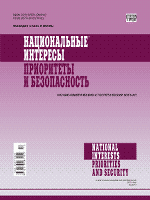Abstracting and IndexingРИНЦReferativny Zhurnal VINITI RAS Worldcat LCCN Permalink Google Scholar Online availableEastvieweLIBRARY.RU Biblioclub |
The effectiveness of an executive: what determines it?
Available online: 23 September 2014 Subject Heading: PROBLEM. RESEARCH. SOLUTION JEL Classification: Pages: 53-63
The original motive of the studies submitted in the article arises from the interest to identify the qualities by which owners of domestic companies select top managers for their business, in particular, what requirements they impose for such workers when employing them. To get the answer to the question posed, the author used the questionnaires of corporate executives, analysis of the views of shareholders of the reasons for their selection of candidates for corporate Boards of Directors. In addition, the author examined some examples of the interaction between shareholders and top heads of companies. On the basis of the received results, the paper determines that when choosing a leader for the company, the principals actually appreciate two key groups of characteristics. First, they look for the requirement for a high qualification of the candidate, and secondly, for the candidate's sufficient loyalty. At the same time, the importance (weight) of each of the factors for a particular position is taken into account in the work. The author points out that the importance of the loyalty increases for the economies of the countries on the way of emergence of developed market institutions, as it is currently running in Russia. The polls also have shown the existence of an inverse relationship between the two observed groups of qualities. In the majority of the observations it was identified that the more loyal executives were not at the same time the most qualified and vice versa. It was noted simultaneously, that a more loyal manager often demonstrates the most managerial activity, but this advantage is negated by the presence of lesser qualification and it enables to speak about the managerial problems, which appear in this connections. The results of the study enable to generate recommendations for the shareholders and other principals to reduce the agency costs by the Russian corporations by introducing the correct selection and recruitment managers. The author highlights the key factors characterizing agents capable to ensure the greatest efficiency, and which allow to get rid of the insufficiently effective leaders. Keywords: agency, relationship, executive, head, qualification, loyalty, top managers, selection References:
|
ISSN 2311-875X (Online)
|
|








